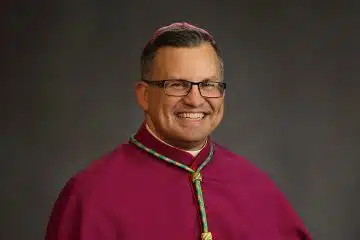With God nothing will be impossible
December 18, 2011
By Sister Betty Jane Lillie, SC
Fourth Sunday of Advent: 2 Samuel 7: 1-5, 8b-12, 14a, 16; Psalm 89: 2-5, 27, 29; Romans 16: 25-27; Luke 1:26-38
As our Advent reflections continue, our first reading this week tells us about David’s desire to build a house/temple for the Lord in Jerusalem (2 Samuel 7:2-3).
The Lord’s response to that desire was rather that God himself would make David a house/dynasty that would rule the kingdom forever (2 Samuel 7:11b-13). God’s promise to David was followed by a prayer of David in which he says to the Lord, “Who am I, O Lord God, that you have done all this for me?” The king may well have been wondering how that could be. The implicit response would have amounted to his realizing that nothing would be impossible with God (2 Samuel 7:18-29).
That same question surfaced in our Gospel reading about the Annunciation of the birth of the Messiah. Mary wondered how that could be (Lk 1:26-38). The answer she received was that nothing will be impossible with God (Luke 1:37). It is the same theme as in the David scenario, but the situations are very different.
On the one hand, David’s dynasty would produce what the people would have considered a messianic person, a temporal leader who would bring peace and productivity to the temporal order. In fact, however, David’s dynasty did not last forever.
On the other hand, Mary’s son would be the Divine Messiah who would reign forever in the heavenly kingdom after bringing the fullness of revelation to the earth, redeeming humankind and opening the gates of heaven. “For with God nothing will be impossible” (Luke 1:37.
The an Gabriel’s greeting to Mary would be “Hail.” That could also be interpreted as “Rejoice!” “Rejoice O favored one, the Lord is with you!” Some ancient versions also add, “Blessed are you among women!” That address likely came as a great surprise to Mary who would have wondered what sort of greeting that might be. Mary was troubled at the saying, and she likely would not have reflected back to the Prophet Zephaniah who had announced that the Lord was in the midst of Jerusalem. He would rejoice over His people with gladness and renew them in His love (Zephaniah 3:14-17).
The angel continued, “Do not be afraid Mary, for you have found favor with God” (Luke 1:30-31). Then followed the announcement of the divine motherhood. Who would not tremble at such a prediction! How could that be? The answer came in a Trinitarian context. “The Holy Spirit will come upon you and the Most High will overshadow you; therefore the child to be born of you will be called holy, the Son of God.”
The authenticating sign came in the form of the good news of Elizabeth’s motherhood. “For with God nothing will be impossible” (Luke 1:36-37). At that point, the narrative jumps ahead to the time of its writing. It takes for granted Mary’s faith and leaves the reader to imagine the feelings and wonderment of Mary at the time of the announcement. No doubt she tried to understand all that was involved in the message she received, and then went with haste to visit Elizabeth. The same Gospel tells us a little further on that she kept all these things pondering them in her heart (Luke 2:19).
Psalm 89 expresses some thoughts that put the situation in focus for us: “I will sing of thy steadfast love, O Lord, for ever, thy faithfulness is firm as the heavens. I will establish His throne as the days of heaven.”
Sister Betty Jane is a faculty member at the Athenaeum of Ohio.













